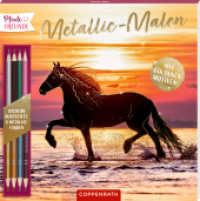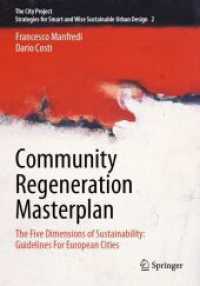- ホーム
- > 洋書
- > 英文書
- > Literary Criticism
Full Description
Noted as a 'civil poet' by Alberto Moravia, Pier Paolo Pasolini was a creative and philosophical genius whose works challenged generations of Western Europeans and Americans to reconsider not only issues regarding the self, but also various social concerns. Pasolini's works touched and continues to inspire students, scholars, and intellectuals alike to question the status quo. This collection of thirteen articles and two interviews evidences the on-going discourse around Pasolini's lasting impressions on the new generation.
Pasolini's Lasting Impressions: Death, Eros and Literary Enterprise in the Opus of Pier Paolo Pasolini thus explores the civic poet's oeuvre in four parts: poetry, theatre, film, and culture. Although the collection does not include every genre in which Pasolini wrote, it addresses many, some which often receive little or no attention, particularly in Italian Studies of North America. The underlining theme of the book, 'death, eros and literary enterprise' intertwines these genres in a rather unique way, allowing for inter-disciplinary interpretations to Pasolini's rich opus.
The edited volume concludes with two artists, Dacia Maraini and Ominio71's reflections on Pasolini in the 21st century. In fact, the cover represents a recent work on Ominio71 underscoring Pasolini's visual presence still within the Roman walls. In conclusion, this collection demonstrates how his works still influence contemporary Italian society and motivate intellectual dialogue through new theoretical outlooks on Pasolini's oeuvre.
Contents
Acknowledgments
Introduction: Pasolini Studies—Forty Years in the Making
Ryan Calabretta-Sajder
Part 1: Pier Paolo Pasolini and Verse
1 Pasolini's Poetry: The Language of the Mother
Daniela Bini
2 Jesus Narcissus: Pasolini's Self-Representation as Scapegoat and Martyr in His Friulan Verse
William Van Watson
3 Poetic Gazing: The "Word-Eye" in the Poetry of Pier Paolo Pasolini
Flaviano Pisanelli
Part 2: Pasolini and the Stage
4 Pasolini's Orestiade, the Irrational and Greek Tragedy
Francesca D'Alessandro Behr
5 Dreams as Gendered Places: Feminist (Re)Awakenings in Pasolini's Caldéron
Ryan Calabretta-Sajder
Part 3: Pasolini through the Lens
6 Il "cinema di poesia" from Theory to Practice: The Case of Edipo Re
Millicent Marcus
7 Violence in Pier Paolo Pasolini's Cinema
Francesco Rosetti
8 The Bibliography of Salò: Eros, Sadism, and Avant-Garde in Pier Paolo Pasolini's Last Work
Fabio Benincasa
9 Oedipus and Medea According to Pasolini
Giulia Tellini
10 Pasolini's Deca







